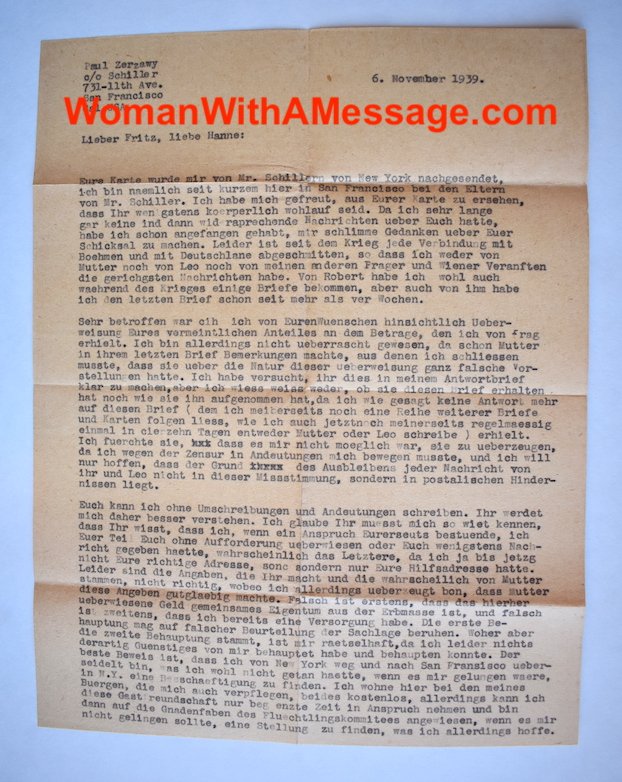Link to Family Tree to understand family relationships.
Today we see a copy of the first page of a letter Helene’s nephew Paul Zerzawy wrote to his step-brother Franz Orlik and his wife Hanne in Haifa. Paul’s father Julius married Franz’s mother in 1921, long after Paul and his brother Robert had left home and were living independent lives. Paul arrived in the U.S. in April 1939 and had been trying to make his way in New York City before giving up and joining his young cousins Eva and Harry and other family members in San Francisco. Perhaps he only stayed in New York long enough to make sure Eva and Harry arrived safely by ship and put them on a train to San Francisco (see October 23rd post). In New York, Paul’s mother’s cousin Bertha Schiller’s son Arthur provided advice and assistance. In San Francisco, Bertha and her husband George opened their home to my mother Eva while she finished high school. Upon Paul’s arrival in San Francisco, Bertha and George welcomed Paul too. In the letter he refers to his step-mother as “Mother” and mentions Leo, her brother.
6 November 1939
Dear Fritz, dear Hanne:
Your card was sent to me from Mr. Schiller from New York, I have been in San Francisco just a short time now, staying with Mr. Schiller’s parents. I was happy to see that you are at least in good health. Since I haven’t had any news about you for a very long time, and then contradictory news, I had already begun to worry quite a bit about your fate. Unfortunately, since the war, all connections with Bohemia and Germany have been cut off so that I have had no news at all from Mother nor from Leo nor from any other relatives in Prague or Vienna. I have received some letters from Robert during the war, but I haven’t heard from him in about 4 weeks.
I was very concerned about your wishes about your alleged share of the amount of money I got from Prague. I am not surprised however, because Mother in her last letter made some comments from which I understood that she had some quite false ideas about the nature of this money transfer. I tried to make this clear to her in my reply letter, but I’m not sure whether she got this letter, nor how she may have received the news since as I said, I have had no answer from this letter (to which I sent a number of further letters and cards, as I still regularly write either to Mother or Leo every two weeks). I’m afraid that it wasn’t possible for me to convince her, because I had to write sort of in insinuations because of censorship, and I want to hope that the only reason that there hasn’t been any news from her and from Leo did not have to do with this ill humor and could be blamed on postal issues.
I can write to you without circumlocutions and insinuations. You will then understand me better. I think you must know me well enough to know that if you were due anything, I would send you your part of it without being asked, or I would at least let you know about it, especially the latter because up until now I didn’t have your correct address, only your auxiliary address. Unfortunately, the allegations that you make which probably come from Mother are not correct, but I am convinced that Mother did this in good faith. It’s not true first of all that the money left over that has been sent here is everyone’s common property from the inheritance. And secondly, it is not true that I already am provided for. The first claim is probably a result of an incorrect interpretation of the circumstances. But it is puzzling to me where the second claim comes from, because unfortunately I have not and could not report anything so positive about myself. The best proof of this is that I left New York and moved to San Francisco, which I probably would not have done if I had been able to get any kind of work in New York. I am staying with the family of my sponsor who are taking care of my needs without asking for money, but I cannot take advantage of this hospitality for more than a limited amount of time, and after that I will be at the mercy of the refugee committee if I am not able to find a job, which of course I hope I will.
We have seen parts of this “conversation” earlier in the year – we saw a card from Paul’s step-mother in the February 10th post. In the letter above, he refers to earlier correspondence like the card saw in the September 19th post.
By the time Paul and Robert’s father Julius married Franz’s mother in 1921, he had been widowed twice – once in 1902 and again in 1910. He was a soldier in World War I. By the end of 1918, only his children Paul and Robert were still living – his son Erich died while a POW in Eastern Siberia, and his two daughters died while in their teens. In his October 3rd letter, Paul muses about the state of their finances and their grandmother’s fate if they cannot afford to keep the family home in Brüx. It must have been very disorienting after the war for Julius to find himself with an empty nest – perhaps no nest at all. It makes sense he would want to marry again. Julius died in January 1939 and it appears from this letter that his step-mother and step-sibling expected a larger share of his estate.
